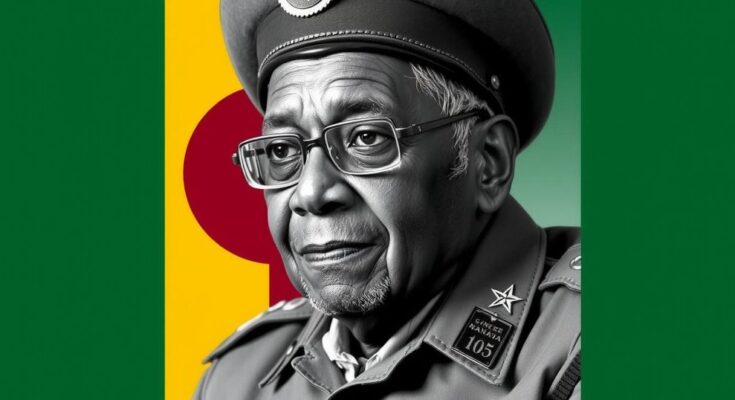General David Musuguri, the Tanzanian general renowned for commanding forces in the overthrow of Idi Amin, has died at the age of 104. He led Tanzania’s military efforts during the Uganda-Tanzania War, resulting in Amin’s ousting and played a substantial role in shaping post-Amin Uganda’s military landscape. Musuguri is celebrated for his leadership, bravery, and humanitarian efforts throughout his distinguished military career.
General David Musuguri, a venerated military leader known for his role in the overthrow of Ugandan dictator Idi Amin, has passed away at the age of 104. He died in Mwanza, Tanzania, and is remembered for his valor and strategic leadership during the Uganda-Tanzania War. Musuguri, who was affectionately known as “General Mutukula,” rose through the military ranks to serve as the Chief of Defence Forces (CDF) of Tanzania from 1980 to 1988. Musuguri commanded the Tanzanian forces when President Amin’s troops invaded the Kagera region in August 1978. Initially designated as a defensive operation, the mission evolved under President Julius Nyerere’s leadership into a full-scale offensive aimed at ousting Amin. In October 1978, Musuguri led a counterattack alongside Ugandan exiles, culminating in the capture of Kampala in April 1979. Having extensive military experience, Musuguri was a respected figure within the Tanzania People’s Defence Forces (TPDF). His commanding presence and tactical acumen were critical during pivotal battles, such as at Simba Hills, Masaka, and Lukaya. Despite not having formal education, Musuguri’s innate intelligence and extensive battlefield experience positioned him as a key actor in the aftermath of Amin’s fall. Born on January 4, 1920, Musuguri began his military career in the British colonial army in 1942. He served with distinction throughout the World War II, gaining firsthand combat experience. Musuguri had a unique relationship with Amin, having once served as his instructor, and he often cited Amin’s invasion as a profound mistake. After Amin’s ousting, Musuguri played a significant role in shaping Uganda’s post-Amin military structure and governance, earning the title of “Uganda’s unrecorded President.” In his later years, Musuguri’s contributions to military strategy and humanitarian efforts were acknowledged, though he remained a modest man. His death has prompted a wave of tributes from across East Africa, commemorating his legacy as a soldier dedicated to the service of his nation and its neighbors.
General David Musuguri was a prominent figure in East African military history, and his involvement in the overthrow of Idi Amin marks a significant chapter in Uganda’s tumultuous political past. Idi Amin’s regime, which was notorious for its brutality, faced an armed resistance from Tanzania after Ugandan forces invaded its territory in 1978. Musuguri’s leadership during this conflict not only led to the fall of a despotic ruler but also influenced the formation of Uganda’s post-war governance. His extensive military career, beginning with the King’s African Rifles, and his strategic prowess during critical battles against Amin’s forces have rendered him a respected military figure in both Tanzania and Uganda. Musuguri’s legacy is characterized by his dedication to national defense and his compassionate approach to those affected by war, evident in his care for orphans amidst chaos.
The passing of General David Musuguri represents the end of an era for Tanzania and Uganda, as he was a key military leader who played a pivotal role in altering the course of Ugandan history. His legacy as a soldier is enshrined in his strategic command during the Uganda-Tanzania War, and his influence extended beyond the battlefield into post-Amin Uganda’s military restructuring. Musuguri’s life serves as a reminder of the complexities of military leadership, marked by both valor and human compassion. His contributions will be remembered for years to come as East Africa navigates its historical narrative.
Original Source: www.observer.ug




